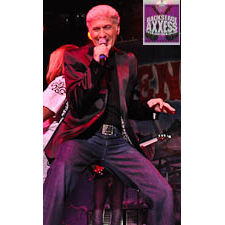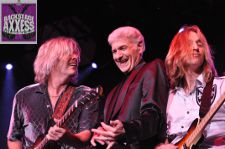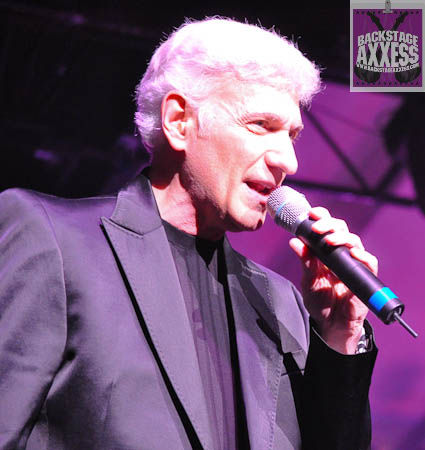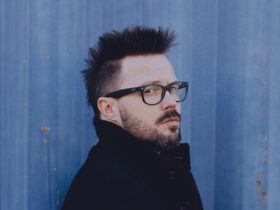In the movie “Big Daddy,” a young boy named Julian is asked to testify to the court what his temporary guardian Sonny, played by Adam Sandler, has taught him. Julian testifies that, “he taught me to pee on a building and that Styx is the greatest band in the world and only got a bad rap because most critics are a@@holes.”
Growing up in late 1970s and early 1980s, I-like many others my age- was a huge fan of Styx even though the critics were not. In 1979, the first rock concert I ever went to was Styx, they were touring in support of their ‘Cornerstone’ album. It ignited a passion for live music that still burns today, so one can only imagine what a thrill it was for me to interview Dennis DeYoung. Dennis spoke candidly and extensively about why critics gave Styx a bad rap. He also talked about his approach to songwriting, and how he embraced his ability to write a great love song, while still writing songs with deep social commentary that seemed to go almost unnoticed, along withother topics.
I hope you enjoy this interview as much as I did.
Thom: I recently saw your Acoustic Show of Styx music in Verona, NY, and you spoke about a good song being like “yellow cake.” In other words, you can dress up the cake, but in order for it to taste good the base or yellow cake has to be good. In that respect, what Styx song was it toughest to get to that “yellow cake” and still make it sound good.
DDY: Well, I think a song like “Roboto” which was an unusual composition of mine because it was not based on the piano. It was written with the aid of a Roland synthesizer. I can’t remember the model but it was the first synthesizer that had an arpeggiator on it, which is like an early sequencer. The way it worked was that you could hold one note down and make it play any number of rhythmic patterns. In this particular case, I held this one program down and it made a ding ding ding sound and then I added a rhythm piece to it and I came up with “Roboto” that way. So that song, being based on an arpeggiated synth pattern, it made the song more challenging to play acoustically because it is so specifically stylized. That kind of syntho-pop sound, to translate it to acoustic instruments, is what made it the most challenging. The other songs, they were easily manipulated to play acoustically because of their structure.
Thom: I have to agree. I assumed it would be the most challenging, but it came off very well. Were you surprised at how well “Roboto” translated to an acoustic song?
DDY: Well, that is difficult for me to judge but it’s the same challenge I face when I do orchestra shows. Some songs translate very well to the orchestra. For instance, if you have a song like “Johnny B. Goode” that doesn’t necessarily translate well for an orchestra, as opposed to a song like “Come Sail Away,” which is based on the piano and has orchestral synth sounds in it. So, just by a song’s nature it can make it easier to translate into other mediums. As far as “Roboto” goes, I think it comes off O.K. because people love it! My songs are very melody based anyway; if there is a good melody and you are playing it stripped down, it will always come off O.K.
Thom: Another song that played very well was the only song from your solo career, “Desert Moon.” I thought that song was a highlight of the evening, and that the acoustic version in many ways sounded better than the studio version.
DDY: That song was written on piano, the intro is a long piano piece that I embellished with some synth pieces and guitars in the studio. I wasn’t really surprised that song came off well because “Desert Moon” is all about my voice. In the case of that song, when you strip it down, the audience really gets to focus on the lyrics and the melody and the singing. Since that is my strongest quality -I always used to think I was a melody guy in a rhythm age- those kinds of things come off really good acoustically.
Thom: Speaking of style, you made love songs cool. I mean you were singing these gut wrenching ballads in smoke filled hockey arenas and people loved those songs, you truly are a master at that craft. However, there is another side to your writing, the social commentary element, songs like “Grand Illusion” that attacked materialism, the concept albums like “Paradise Theater” and “Kilroy” and this is even more evident on “100 Years From Now” with songs like “Private Jones.” It seems like you don’t get asked a lot about the social commentary element in Styx’s music.
DDY: I think the people that would be asking those types of questions would be the writers, but because of the way Styx became successful, which was extremely convoluted. For example, the Styx II album- the song “Lady” was written for the first Styx album but the producer had other ideas, he also was the president of the record company. He had us do four cover songs for the first album, which none of us were in favor of doing, but heck, we did it because when you are young you want a record deal. Then Styx II came out with “Lady” on it and it was a total failure. It was by accident that the song became a hit in 1975. Because of that, the style of music we were playing in 1971 and 1972, which was a combination of melodicism, hard rock and high vocal harmonies, wound up being associated with bands that came after us. We didn’t show up on the national stage until 1977 and by that time, bands like Queen -and “Lady” was written and recorded before Queen recorded a record -and other bands like Foreigner, Boston, Kansas, and all the other ones like Journey, were all on the national stage. We seemed like second generation to them because of how long it took us to hit the national stage. We never got credit for doing it first and so when it came to journalists being interested in you, because many of them don’t do their homework, they simply thought we were following in the footsteps of bands we preceded and so our lyrics were dismissed and because our style was rather bombastic.Some people even say we were pretentious, but I don’t think there is anything wrong with being pretentious. I mean, there would be no classical music at all if music couldn’t be pretentious. That hurt any serious discussion about our lyrics. Let me give you an example, and I can tell you are a fan just by the way you talk. If you looked at Journey or Foreigner or Queen for that matter, and you looked at their lyrical content, they never ever, to the best of my knowledge, had any interest in social commentary.
 Thom: That’s very true and it has always perplexed me that nobody seems to talk about the social commentary in Styx songs.
Thom: That’s very true and it has always perplexed me that nobody seems to talk about the social commentary in Styx songs.
DDY: You know, you are right, because when we are lumped with all those other mainstream seventies rock bands, I never see that aspect mentioned. Not only from my songs, but also from all the songs the band did and their themes. Why did that happen? I don’t know. I think it was just a big dose of bad luck.
Thom: ‘Kilroy was Here,’ that whole album was an answer to the people that labeled Styx as satanic because of the supposed backwards masking on “Snowblind.” Did the band ever listen to that section of the song backwards?
DDY: Yes we did. It actually sounded like what they claimed. I remember clearly putting the record on in the recording studio. In fact, all of us were sitting around and it sounded like what they said it was, it sounded like “Satan moves in our voices.” The last word wasn’t as clear but it could have been construed as voices. All I can say to that claim is that it is hard enough to make the record sound good going forward. I’ve always said that the reason it turned out that way is like the old expression about monkeys and typewriters.
Thom: I always found it bizarre Styx was labeled satanic; I mean, you had some social commentary but for the most part, your songs were about love. Bands like Black Sabbath overtly used those themes, but Styx?
DDY: It was a bit ridiculous. I guess if you go back to some of those early Styx albums like ‘The Serpent is Rising’ and a song like “Witch Wolf” or “Man of Miracles,” then maybe you could make a claim that there was some sort of mysticism going on. So many bands were overtly using those types of messages but that wasn’t us.
Thom: Those albums you recorded for the Wooden Nickel, they sure were of a different style than Styx fans are used to now.
DDY: By and large, I don’t like them and I have said it publicly and I know that doesn’t make me the greatest salesman in the world. I always contended that “Styx II” should have been our first album and then “Equinox” our second. But because we were told what to do on the first one and it was just a local record company with no money for promotion. I wrote five of the seven songs on “Styx II.” That was my coming out party as a songwriter. “Lady” was the first song I ever sang and wrote that wound up on a record. That is a pretty good start! But because “Styx II” was so thoroughly rejected, I thought people just didn’t like what I did. Therefore, on the next two albums, I tried to write like anybody but who I was.
Thom: I think you ran into some of those same issues with “Babe.” The song was a smash hit but critics knocked it as overly sappy, even though there were certainly songs out there at the time that were much sappier than “Babe.”
DDY: Well, “Babe” is a song about separation. It’s not a pure love song, even though it obviously is a love song, but at the heart of it, the song is about separation and anybody that listened to that song got it. Anybody that has to travel away from their family relates to that song and gets the message. When you are in the realm of romantic love songs, they always get a bad rap from the rock press, but people…they love slow love songs. They just do. They like anything that moves them emotionally. You can write a mediocre to less than mediocre rock song and get by with it, but if you write a love song, it had better be really great because they come under a lot of undue criticism. It was not just us, it’s everybody!Anybody that writes a love song will come under criticism from the music writers because they fear sentimentality. I once talked to the now deceased manager of a manager of a famous rock band -I won’t tell you the name of the manager or the song- but he had a disagreement with his band over a song they were going to release, which went to number one. It was a big love song and it has gone on to be that bands biggest record, and one of the favorites of anybody who likes music. People who are afraid of those kinds of romantic notions about love and sentimentality…I don’t trust them as human beings. Cheap sentimentality is better than none at all and I’m sticking to that.
Thom: Speaking of sentimentality, you have a great marriage to your wife Suzanne, to whom you have dedicated many of your greatest love songs to. In the years when Styx was on the album/tour cycle, how did you balance your family life with the rock star life.
DDY:I took them on the road with me. My wife and my daughter traveled with me and so did my son when he was born in 1980. They were with me all the time from 1976 forward. It was something I absolutely needed.
Thom:Wow, that is pretty amazing.
DDY: It was something I needed. I did not like the separation from my family, as I mentioned earlier, I wrote “Babe” about separation.
Thom:Speaking of touring, your upcoming shows are listed as “The Music of Styx,” but will you be performing any of the songs from ‘100 Years from Now?’
DDY: I did when the album first came out, but Thom, one must face reality. By and large, acts like me get hired for reasons of nostalgia. The vast majority of the people that pay to see me, and more importantly the people who hire me, want to hear the old stuff, and if I don’t get hired Thom, I can play all the solo stuff I want in my living room.
Thom: So is that frustrating? I mean you have recorded a lot of great songs as a solo artist, especially the stuff on ‘100 Years From Now.’
DDY: I have many songs from my solo catalogue that are great songs and I would love to play them live. From ‘100 Years From Now’ we played six of them live over the last few years, but I dropped everything when I added August Zadra in the band and we really started playing the music of Styx. Songs that August sings like “Renegade,” “Too Much Time on My Hands” and “Fooling Yourself” have taken up spots in my set list that I once used for solo material. We have done “Private Jones,” “Turn off CNN,” “Crossing the Rubicon,” “100 Years From Now” and “This Time Next Year” live and we will be playing those songs next week in Quebec because it was a number one record up there.
Thom: You have a long and storied history with Quebec.
 DDY: Yep, it’s a great place to be famous. They are great people, they love music, they have a great culture and great food.
DDY: Yep, it’s a great place to be famous. They are great people, they love music, they have a great culture and great food.
Thom:Back to the current band, where did you find August Zadra? He has a great voice and plays a mean guitar.
DDY:My son found him on YouTube. My son called me up one night and said, “look at this guy.” That’s how it happened. Up to that point, I didn’t plan on doing that because for ten years I had not performed any song that I had not written or sung. Then I saw him and said, “Good Lord!Doesn’t he sound like you know who?” And I thought,” Good Lord!He is a good stage performer and he can play guitar.” It seemed like a sign to me Thom.
Thom: It is nice to see you lay your rightful claim to that part of the catalog because you played an important role in making those songs famous.
DDY:For 95% of the people in the audience, those are the songs they love.For ten years, if you went to see Styx or me, you never really got the complete picture, because there were songs that Styx was not doing and there were songs that I was not doing. But now we have that, and people are embracing this show more than I ever thought they would. It really made a difference to people, which surprised me. It shouldn’t have surprised me, but it did.
Thom:Those songs were part of the soundtrack of a generation.
DDY:Yeah, I went to see Paul McCartney recently and he did a couple of songs off his latest album, and I think that McCartney’s latest is his best in many years, but I don’t like the first three songs and he played one of them called “Dance Tonight.” He has all these great Beatles songs and solo material and I’m just like everybody else, I want him to play those songs.
Thom:I almost wonder if the Beatles could have gone on without Paul or John.
DDY:No!No way!
Thom:In some respects I think that has happened with Styx, you were as important an element to Styx as Lennon and McCartney were to The Beatles.
DDY:To me, Styx will always be the band that recorded the albums from ‘Equinox’ to ‘Kilroy.’ That is the quintessential Styx. That would include John Curelewski who did have a big hand in “Equinox” before Tommy. ‘Edge of the Century’ was a great album and I think that ‘Brave New World’ had potential, but it was just completely botched. The real heart of the band was those five guys, JY, the Panozzo brothers, Tommy and me. That was when the greatest music was created, between 75-83.
Thom: What was the reason John Curelewski left the band?
DDY: He didn’t want to tour. He left before it all happened and it must have been difficult for him to live with.
Thom: He died very young.
DDY: Yep
The interview ended after I shared some memories with Dennis about the first time I met him back in 1981 when I was fourteen years old, and I thanked him for a lifetime of great music and memories. Dennis graciously thanked me for being a fan.
We would like to thank Tim Orchard and David Radley from the Dennis DeYoung camp for helping us set up and allow us to take photos for the interview.
For more information on Dennis, please go to: http://www.dennisdeyoung.com/.
All photos by Dee Haley






